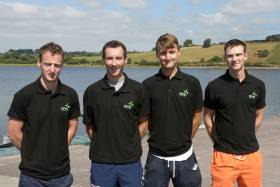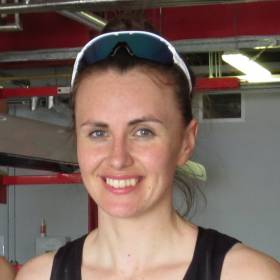Displaying items by tag: Beggan
Beggan Best at Dublin Sculling Ladder Time Trial
#Rowing: Niall Beggan of Commercial won the time trial for the Dublin Sculling Ladder at Islandbridge today. His time of six minutes 53.87 seconds was over two seconds clear of his Commercial clubman, Mikey Campion, who was second. Beggan had also won in 2017. The fastest woman was Aoife Moloney, also of Commercial, with Neptune’s Claire Feerick second.
#Rowing: Ireland’s lightweight quadruple scull of Miles Taylor, Niall Beggan, Ryan Ballantine and Andrew Goff won their repechage and moved into the A Final at the World Under-23 Championships in Poznan, Poland.
The Ireland crew would have gone through with first or second and they disputed the lead with Spain until half way. But Ireland hit that line first and went on to lead. Germany tried hard to push into the top two, but Spain rebuffed them, while Ireland had a one-length lead from Spain at the finish. Britain finished fourth.
Hugh Sutton also came through in his repechage. The 19-year-old raced well to take second and qualify for the quarter-finals of the lightweight single sculls. Four from six qualified. Early on, Egypt’s Omar Amer, who had made a false start, fell to the back of the race and stayed there throughout, while Turkey’s Enes Yenipazarli shot into a lead he would never lose. Sutton stayed in second for most of the race, swapping it with American Zachary Heese, but then beating him in a sprint in the closing stages.
The Ireland men’s and women’s lightweight double sculls had earlier made it directly through their heats.
World Under-23 Championships, Poznan, Poland (Irish interest; selected results)
Men
Lightweight Quadruple Sculls – Repechage (First Two to A Final; rest to B Final): 1 Ireland (M Taylor, N Beggan, R Ballantine, A Goff) 6:01.47, 2 Spain 6:04.02.
Lightweight Double Sculls – Heat Three (First to A/B Semi-Finals; rest to Repechage): 1 Ireland (F McCarthy, J McCarthy) 6:35.94.
Lightweight Single Sculls – Repechage (Top Four to Quarter-Finals; rest to E Final): 2 Ireland (H Sutton) 7:21.51
Women
Lightweight Double Sculls – Heat Four (First Two to A/B Semi-Finals; rest to Repechage): 2 Ireland (L Heaphy, M Cremen) 7:37.99.
Commercial and UCD Double Test O'Donovans at Cork Regatta
#Rowing: Niall Beggan and Andrew Goff gave Gary and Paul O’Donovan a good battle in the Division One double sculls at Cork Regatta today. The Ireland under-23 lightweights, drawn from UCD and Commercial, placed second behind the Ireland senior lightweight double, ahead of Shane O’Driscoll and Mark O’Donovan.
NUIG won the men’s fours and the Skibbereen/UCC composite the women’s four by convincing margins. Cork won the women’s double, while Lee’s juniors took second.
Cork Regatta, National Rowing Centre, Cork, Day Two (Selected Results)
Men
Four – Div One – A Final: 1 NUIG (sen) 6:16.41. Four, coxed – Div Two – A Final: 1 Queen’s B (club two) 6:53.69, 2 St Michael’s (jun 18B) 6:56.53; 6 Presentation, Cork (jun 16) 7:33.61.
Sculling, Double – A Final: 1 Skibbereen (G O’Donovan, P O’Donovan; sen) 6:25.51, 2 Commercial, UCD (N Beggan, A Goff; sen) 6:27.62, 3 Skibbereen (M O’Donovan, S O’Driscoll; sen) 6:37.997; 5 Three Castles A (jun 18A) 6:49.76. B Final: St Michael’s (inter) 6:51.20.
Single – Div Two – A Final: 1 Three Castles (A Keogh; jun 16) 7:29.64, 2 Cappoquin (S Landers; club two) 7:35.39; 6 Killorglin (J McCarthy; Jun 18B) 7:52.86.
Women
Four – Div One – A Final: 1 Skibbereen, UCC (N Casey, E Hegarty, A Keogh, D Walsh; sen) 6:59.0. B Final: Col Iognaid (jun 18A) 7:39.68.
Sculling, Double – Div One – A Final: 1 Cork (inter) 7:19.591, 2 Lee (jun 18A) 7:23.45. B Final: 2 Carlow (club one) 7:40.31.


























































